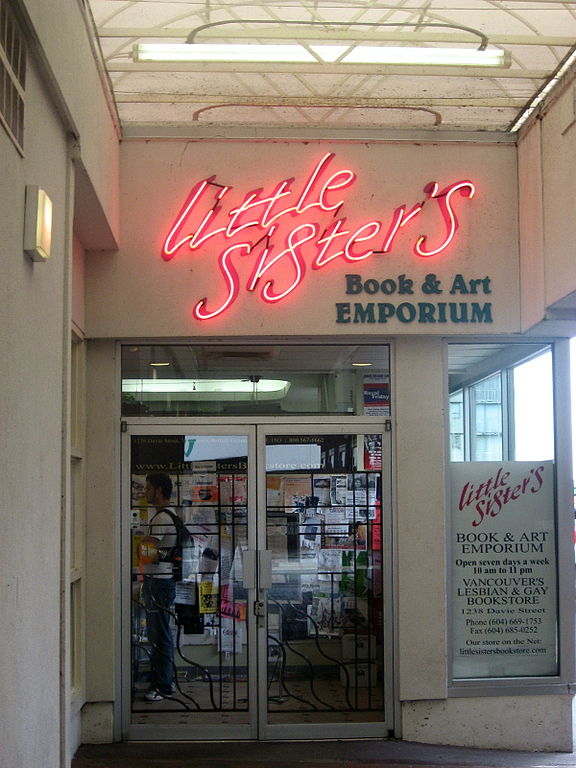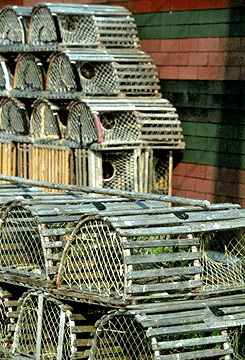Browse "Things"
-
Article
Literary History in English 1980-2000
The last two decades of the 20th century were marked by growing social and economic conservatism, a tendency towards fewer gambles in PUBLISHING ventures, and a greater reliance on computer TECHNOLOGY (e-mail, internet communications, electronic journals such as Frank DAVEY's Swift Current): A.K.
"https://development.thecanadianencyclopedia.ca/images/tce_placeholder.jpg?v=e9dca980c9bdb3aa11e832e7ea94f5d9" // resources/views/front/categories/view.blade.php
https://development.thecanadianencyclopedia.ca/images/tce_placeholder.jpg?v=e9dca980c9bdb3aa11e832e7ea94f5d9
-
Article
Literary History in English in the 21st century
This troubled period began with the Y2K scare, when COMPUTER programs worldwide were expected to fail. 3000 people, 25 of them Canadian, died in the New York Trade Center bombings on "9-11" 2001.
"https://development.thecanadianencyclopedia.ca/images/tce_placeholder.jpg?v=e9dca980c9bdb3aa11e832e7ea94f5d9" // resources/views/front/categories/view.blade.php
https://development.thecanadianencyclopedia.ca/images/tce_placeholder.jpg?v=e9dca980c9bdb3aa11e832e7ea94f5d9
-
Collection
Literature in Canada
With the works of such internationally acclaimed authors as Margaret Atwood, Michael Ondaatje, Alice Munro and Lawrence Hill, Canada is a force to be reckoned with on the literary stage. The Canadian Encyclopedia includes a variety of articles about literature in Canada, both fiction and non-fiction, gathered by topic in this collection.
"https://d2ttikhf7xbzbs.cloudfront.net/media/media/cd97eea1-c1f1-4a12-ab10-611eb16a82a7.jpg" // resources/views/front/categories/view.blade.php
https://d2ttikhf7xbzbs.cloudfront.net/media/media/cd97eea1-c1f1-4a12-ab10-611eb16a82a7.jpg
-
Article
Literature in English: Language and Literary Form
This article offers an overview of the history and development of Canadian English literature from the mid-20th to present day, including several of its early influences from various other languages.
"https://development.thecanadianencyclopedia.ca/images/tce_placeholder.jpg?v=e9dca980c9bdb3aa11e832e7ea94f5d9" // resources/views/front/categories/view.blade.php
https://development.thecanadianencyclopedia.ca/images/tce_placeholder.jpg?v=e9dca980c9bdb3aa11e832e7ea94f5d9
-
Article
Literature in English: Teaching
In colonies, the literary tradition of the mother country normally prevails. This was true in Canada, where it has taken English-speaking Canadians a long time to accept their own literature as a legitimate subject for study.
"https://development.thecanadianencyclopedia.ca/images/tce_placeholder.jpg?v=e9dca980c9bdb3aa11e832e7ea94f5d9" // resources/views/front/categories/view.blade.php
https://development.thecanadianencyclopedia.ca/images/tce_placeholder.jpg?v=e9dca980c9bdb3aa11e832e7ea94f5d9
-
Article
Literature in English: Theory and Criticism
Samuel Taylor Coleridge, a principal source of modern literary theory in English, made little direct impression in 19th-century Canada, largely because literary life in Canada shared the anti-theoretical biases of Victorian England.
"https://d2ttikhf7xbzbs.cloudfront.net/media/media/b92b7c2b-030a-4e8b-a2d8-11b69cff66a6.jpg" // resources/views/front/categories/view.blade.php
https://d2ttikhf7xbzbs.cloudfront.net/media/media/b92b7c2b-030a-4e8b-a2d8-11b69cff66a6.jpg
-
Article
Literature in French: Scholarship and Teaching
The first substantial publication devoted to French Canadian literature was James Huston's Répertoire national (1848-50; repr 1982), a 4-volume annotated anthology of writings culled from early Québec newspapers.
"https://development.thecanadianencyclopedia.ca/images/tce_placeholder.jpg?v=e9dca980c9bdb3aa11e832e7ea94f5d9" // resources/views/front/categories/view.blade.php
https://development.thecanadianencyclopedia.ca/images/tce_placeholder.jpg?v=e9dca980c9bdb3aa11e832e7ea94f5d9
-
Article
Literature in French: Theory and Criticism
No French-language literary critic in Canada seems to have stature among writers equal to that of Bayle, Sainte-Beuve or Barthes in France. Nevertheless, several writers have won a degree of prominence as much (if not more) for their works of criticism as for their other writings.
"https://development.thecanadianencyclopedia.ca/images/tce_placeholder.jpg?v=e9dca980c9bdb3aa11e832e7ea94f5d9" // resources/views/front/categories/view.blade.php
https://development.thecanadianencyclopedia.ca/images/tce_placeholder.jpg?v=e9dca980c9bdb3aa11e832e7ea94f5d9
-
Article
Little Sister’s Book and Art Emporium
Little Sister’s Book and Art Emporium has long served as a source of 2SLGBTQ+ literature in Vancouver. Founded by Bruce Smyth and his partner Jim Deva in 1983, the bookstore has also been a social and political focal point for the communities it serves. As Deva has asserted, “More than anything else, Little Sister’s represents the power of community.” This power drove Little Sister’s decades-long legal battle with Canada Customs over censorship and the seizure of imported gay literature.
"https://d2ttikhf7xbzbs.cloudfront.net/media/media/576px-Little_Sister_s_Book_and_Art_Emporium.jpg" // resources/views/front/categories/view.blade.php
https://d2ttikhf7xbzbs.cloudfront.net/media/media/576px-Little_Sister_s_Book_and_Art_Emporium.jpg
-
Macleans
Littleton Massacre
At first they thought it was a prank, the kind of crazy thing that students just a month from graduation might pull.This article was originally published in Maclean's Magazine on May 3, 1999
"https://development.thecanadianencyclopedia.ca/images/tce_placeholder.jpg?v=e9dca980c9bdb3aa11e832e7ea94f5d9" // resources/views/front/categories/view.blade.php
https://development.thecanadianencyclopedia.ca/images/tce_placeholder.jpg?v=e9dca980c9bdb3aa11e832e7ea94f5d9
-
Article
Liverwort
Liverwort, small terrestrial plant belonging, with mosses and hornworts, to division Bryophyta.
"https://d2ttikhf7xbzbs.cloudfront.net/media/media/687f71e6-ded3-41e0-82fa-ffe7b94cf180.jpg" // resources/views/front/categories/view.blade.php
https://d2ttikhf7xbzbs.cloudfront.net/media/media/687f71e6-ded3-41e0-82fa-ffe7b94cf180.jpg
-
Article
Lizard Species in Canada
Lizards are reptiles that belong to several suborders within the order Squamata (which also includes snakes). They are the most diverse group of living reptiles and are found on all continents except Antarctica. There are six species of lizard currently found in Canada. In addition, one species, the pygmy short-horned lizard, is extirpated. This means that, while it continues to live in other parts of its range, it is no longer found in Canada. Five of the six lizard species in Canada are native, while the sixth, the common wall lizard, is introduced from Europe.
"https://d2ttikhf7xbzbs.cloudfront.net/media/new_article_images/GreaterShortHornedLizard/GreaterShortHornedLizard2.jpg" // resources/views/front/categories/view.blade.php
https://d2ttikhf7xbzbs.cloudfront.net/media/new_article_images/GreaterShortHornedLizard/GreaterShortHornedLizard2.jpg
-
Article
Lobbying in Canada
Lobbying is the process through which individuals and groups articulate their interests to federal, provincial or municipal governments to influence public policy or government decision-making. Lobbyists may be paid third parties who communicate on behalf of their clients; or they may be employees of a corporation or organization seeking to influence the government. Because of the possibility for conflict of interest, lobbying is the subject of much public scrutiny. At the federal level, lobbying activities are governed by the Lobbying Act. Provinces and municipalities have their own lobbying laws and by-laws.
"https://d2ttikhf7xbzbs.cloudfront.net/media/media/11551bec-a5f6-4e78-b101-265ddf7610cb.jpg" // resources/views/front/categories/view.blade.php
https://d2ttikhf7xbzbs.cloudfront.net/media/media/11551bec-a5f6-4e78-b101-265ddf7610cb.jpg
-
Article
Loblaw Companies Limited
Loblaw Companies Limited is a subsidiary of George Weston Limited. It operates supermarkets, drug stores, liquor stores and clothing stores. In 2023, Loblaw Companies Ltd. reported $59.53 billion in revenue and operated more than 2,500 stores, making it Canada’s largest food and drug retailer. It is a public company headquartered in Brampton, Ontario. It trades on the Toronto Stock Exchange under the symbol L.
"https://d2ttikhf7xbzbs.cloudfront.net/media/new_article_images/Loblaw/Loblaw_Groceterias_Limited_Store_No_1_Toronto_ca_1919.jpg" // resources/views/front/categories/view.blade.php
https://d2ttikhf7xbzbs.cloudfront.net/media/new_article_images/Loblaw/Loblaw_Groceterias_Limited_Store_No_1_Toronto_ca_1919.jpg
-
Article
Lobster
Lobster, term applied to 4 groups of decapod ("10-footed") crustaceans: the coral, slipper, spiny and clawed lobsters.
"https://d2ttikhf7xbzbs.cloudfront.net/media/media/128a9835-6345-4713-9a60-2a8abb732614.jpg" // resources/views/front/categories/view.blade.php
https://d2ttikhf7xbzbs.cloudfront.net/media/media/128a9835-6345-4713-9a60-2a8abb732614.jpg
